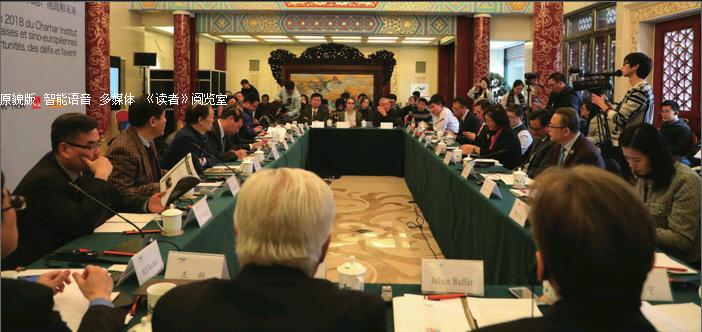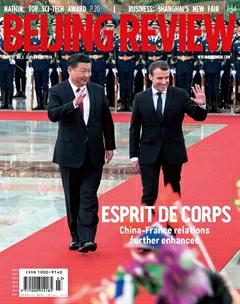PARTNERSHIP FOR THE FUTURE

From January 8 to 10, French President Emmanuel Macron conducted his first state visit to China, bringing new momentum to Sino-French and Sino-European relations. On January 4, Charhar Institute, a Beijing-based think tank, held the 2018 Sino-French and Sino-European Forum in Beijing, attended by scholars, diplomats and media representatives from both home and abroad. At the event, participants held in-depth discussions about the opportunities and challenges facing China, France and Europe in the new era, as well as the cooperation potential between China and European countries under the framework of the Belt and Road Initiative. Edited excerpts of some participants opinions follow:
Sun Haichao, former Chinese Ambassador to the Central African Republic and former Counsellor at Chinas Embassy in France
President Macron is the first foreign head of state to visit China in 2018, and also the first European leader to visit China since the 19th National Congress of the Communist Party of China(CPC) in October 2017, which is of great importance to relations between the two countries.
France has played a leading role among European nations in developing a relationship with China, in 1964, becoming the first Western country to establish ambassadoriallevel diplomatic relations with China. Since then, Sino-French ties have been significant to the people and governments of both nations. France has also taken the lead among Western countries to establish a comprehensive strategic partnership and a strategic consultation mechanism with China. As political relations deepen, France has hosted the first Year of Chinese Culture in the Western world in order to strengthen people-to-people exchanges.
Since Macron came to power, he has sent out positive signals showing that he wishes to strengthen ties with China.
Interactions between the two countries reflect mutual interests and a will on both sides for cooperation. Macron has shown positive attitude toward the Belt and Road Initiative and is of the opinion that Frances economy and French enterprises can benefit from it.
Against the backdrop of a rising tide of anti-globalization, Macrons response has been to make the EU strong and to “make our planet great again,” principles which echo with Chinas proposal of building a community with a shared future for mankind.
Chinas development offers an opportunity for France and the whole of Europe, rather than posing a challenge. It is necessary for China and European nations to join hands in the defense of values such as multilateralism, free trade and globalization in todays world.endprint
Cui Hongjian, Director of the Department for European Studies at the China Institute of International Studies French Minister of the Economy and Finance Bruno Le Maire told the press during his visit to Moscow on January 1 that France is seeking to develop a Moscow-Beijing back- bone of trade, amid increasing uncertainty over relations with the U.S. and the UK. If the two countries are able to reach an agreement to synergize this “backbone” concept with the Belt and Road Initiative, there will be a lot of room for cooperation between the two.
Economic relations are central to bilateral ties, but the Sino-French relationship should not be confined to trade and needs to be expanded to fit a broader brief, with cultural and people-to-people exchanges also able to play an important role. Both China and France are great bastions of culture and we admire each others spectacular contributions to the history and culture of the world. Macron selected Xian, the eastern terminus of the ancient Silk Road, as the first stop on his visit to China, implying that he already understands the culture to some degree.
Macrons visit represents a show of confidence in a stronger future relationship between China and France and China and the EU. Since his election success last year, Macron has conducted swift and resolute reforms at home and he has also established plans to reform the eurozone. The situation is the same in China as the country has entered a new era of development and looks to deepen reform following the 19th CPC National Congress. Both countries are in the process of instituting reforms while facing multifarious challenges, and such similar internal circumstances breed mutual understanding between them.
However, challenges stand in the way for Macron to conduct reform in France and Europe. Faced with pressure from interest groups and rising anti-globalization sentiment, it is still questionable whether his plans can be successfully implemented.
Enhancing mutual trust will be vital for the future of Sino-French ties, and if Macron can apply the resolution and determination showed in his efforts for reform to better develop relations with China, then he can push bilateral ties to a new height, which would concurrently improve Chinas relationship with Europe.
He Wenping, chief researcher of the Institute of WestAsian and African Studies under the Chinese Academy of Social Sciencesendprint
On the issue of global governance, China and France have reached a consensus over promoting globalization and increased regional integration. Macron said in his 2018 New Year speech that “Europe is good for France. France cant succeed without a strong Europe” before reiterating his belief that “Europe can become that economic, social, environmentally-friendly, scientific power that will be able to face China and the United States.” His remarks clearly portray an ambition to enhance regional integration, a stark contrast to Trumps “America first” strategy but in obvious harmony with the China-proposed Belt and Road Initiative regarding concepts of common development.
Chinese President Xi Jinping attended the World Economic Forum at Davos last year and clarified his intent for China to lead global efforts to facilitate inclusive globalization. Together, China and France can work to build an open world.
China and France can also strengthen cooperation in third-party countries, especially those in Africa under the framework of the Belt and Road Initiative. Frances influence in Africa is unmatched by other countries due to its long presence in the continent. The two countries can cooperate on infrastructure and medicine, among other areas. When the Ebola virus spread through West Africa in 2014-15, China and France joined together to address the epidemic and carried out joint research on the virus, an example of the benefits that can come from Sino-French cooperation in Africa.
S u n Y u x i , former Chinese Ambassador to Italy and Poland The China-Europe freight train service is an outstanding development under the framework of the Belt and Road Initiative, which focuses on interconnectivity through the construction of infrastructure. In recent years over a dozen cities in China have established regular train connections with several European cities including Lodz, Hamburg and Moscow. These journeys have been made over 7,000 times, and now during return journeys to China, 90 percent of trains are filled with cargo as China imports more goods from Europe.
Another key development as part of this initiative was the acquisition of the Piraeus, Greeces largest port, by the China COSCO Shipping Group in 2016. Once the construction of the Hungary-Serbia railway, Chinas first railway project in Europe, is completed, China will be able to connect with the continent via sea-land transportation and ship commodities to anywhere in Europe with relative convenience.
The building of infrastructure can enhance regional connectivity and create a large number of job opportunities, as well as releasing untapped cooperation potential among involved countries. No matter their stage of development, all countries will benefit from such connectivity. This is one of the primary reasons why the Belt and Road Initiative is so enthusiastically welcomed around the world.
The initiative also holds at its core the principle of achieving shared benefits through extensive consultation and joint contribution. Every project within its mandate is built according to local development plans and is in line with the common interests of all parties. Guided by such principles, China and Europe will have great opportunities to collaborate in the future.endprint

